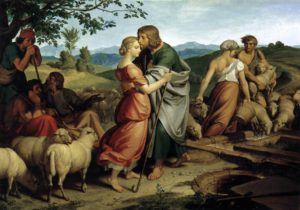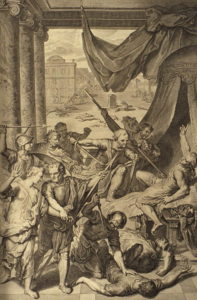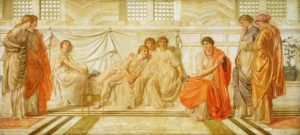
Jacob Encountering Rachel with her Father’s Herds
Joseph von Führich (1800–1876)
[Source: WikiMedia]
Around Valentine’s Day, Facebook thought I might enjoy this HuffPost article, entitled “Romance in the Bible?â€. (Question mark in original.) I once knew its author, back when I myself also worshipped the One True God. This is why Facebook thought I wanted to read it. As it turns out, I was interested, but not in the way that Facebook thought.
It reminded me of several Bible romance stories. And my own reaction to those stories shocked me. I grew up a Christian fundamentalist, and I know those stories inside and out, up and down, backwards and forward.
Yeah, I know. Many Christians, including Evangelicals like I was, have never actually read the Bible. But from a young age, I had. I started with The Picture Bible as a kid, and before I hit adolescence, I was reading through the good-ol’ King James. Eventually, I learned some Biblical Greek and Hebrew, and collected shelves of reference books. None of this disabused me of my faith, because you can always examine those stories through whatever lens you want to.
I now see through a different lens.
I no longer live trapped inside the fundie bubble. It no longer distorts my view in the same way. I see those stories from a different perspective. The Bible’s deity isn’t always the hero. The heathen isn’t always the villain.
Three stories in particular stuck out at me.
The “Rape†of Dinah
In this story from Genesis 34:1-31, a prince named Shechem falls in love with Jacob’s daughter Dinah, makes love to her, and wants to marry her. (That would make her a princess.) Jacob and his sons tell him, fine, you can marry her, but you have to be circumcised first. (Because that’s what the god of Abraham, Isaac, and Jacob convinced great-granddaddy Abraham to do.)
Shechem is so in love with Dinah, he agrees instantly. He convinces the entire city to cut off their foreskins. And three days later, while they are still all incapacitated in their tender parts, two of Dinah’s brothers attack and kill… Every. Single. Male. In the. Entire. City.
Their excuse: “Should he have treated our sister like a prostitute?â€
They say that Shechem “raped†Dinah, but let’s be honest about “rape†in the Bible. The thoughts, rights, and consent of the woman don’t matter. We don’t know what Dinah thought and felt, because the Bible storyteller didn’t care. It wasn’t germane to his story. If Dinah refused, that would not have made it a “rape.†All we know is that Shechem didn’t ask Jacob’s permission first. His problem was that he hadn’t paid her pimp a proper cut. If he had, then he could have raped her all he wanted with impunity.
Enraging, yes. Shocking, maybe. And how romantic, that a man sacrifices the lives of himself and all of his countrymen, all for the love of a woman.

Simeon and Levi slay the Shechemites
Figures de la Bible (1728)
[Source: WikiMedia]
I’d never before seen the romance in that story. As a Christian fundie, I’d only seen sex and violence, crime and justice, and Israel’s supreme being’s all-holy demands and his all-powerful hand. Now, I see that all-encompassing passion the Greeks called eros, that bittersweet longing we call being in love. And I see lives and relationships brutally severed by the moralizations of a few dogmatic believers.
That used to be me. I used to be Shechem.
Leah and Rachel: Sister Wives
Jacob loved Rachel so much that he worked for seven years in order to buy her as his wife. (Genesis 29:16-35.)
Yes, buy. No matter how much Jacob and Rachel loved each other, he needed to negotiate with her father Laban. And Laban cheated him, pawned off Rachel’s older sister Leah. And I guess Jacob was so excited, he never even looked in her eyes. Or it was dark. Or something. In any case, having sealed the deed with Leah, Jacob agreed to work for seven more years for Rachel, too.
Yeah, I get it. Rachel is the young, pretty daughter. Leah is the old, ugly one. And Rachel is Jacob’s favorite. And everyone knows it.
As a polyamorist, I can tell you, this is not a formula for good metamour relations. Leah named her first son Reuben, which means “see, a son,†because, she said, “It is because the Lord has seen my misery. Surely my husband will love me now.â€
Yeah, this is twenty different kinds of wrong.
This, they say, is just one example of why nonmonogamy can’t work.
But really the romance here is not Jacob’s, but Leah’s. Maybe she was trapped in a misogynous, patriarchal system. (She was.) But she still wanted the love of her husband. She wanted his attentions. She wanted to know she mattered to him. And she herself was not enough. She was not worth that on her own. So she tried to buy his love by giving him a son.
It breaks my heart.
As one pseudonymous poly writer put it: “I love the same person you love, though not ever in the same way. Never the same. I cannot quantify love: not mine; not yours; not anyone’s. I understand exquisitely, that when he is with me, he is not with you, and I am grateful that you are willing to gift me a portion of his time and attention. I know that isn’t always easy.â€
I am always thankful to my metamours, who give up part of the time and attention of the ones they love, for me. And I am always thankful to my partners, for treating our relationship as unique and important and valuable, because I matter to them, and they matter to me.
Solomon’s One Fatal Weakness
King Solomon “loved many foreign women,†including “seven hundred wives of royal birth and three hundred concubines.†(1 Kings 11:1-13)
Talk about nonmonogamy, huh?
But more importantly, he was nonmonogamous with his divine ruler, who took most of his kingdom in the divorce.

The Shulamite (1864) – The Shulamite (of the Song of Songs) relating the glories of King Solomon to her maidens
Albert Joseph Moore (1848–1893)
[Source: WikiMedia]
He was the wisest man in the world (1 Kings 4:29-34). This is the guy who wrote not only Proverbs and Ecclesiastes but also the the Song of Songs, which is Solomon’s, the most romantic book in the entire Bible. And this was Solomon’s one fatal weakness, not that he loved so many women, but that his heart was moved to serve other gods by his passion for his wives.
This passion inspired him to write in the voice of his Beloved:
Awake, north wind,
and come, south wind!
Blow on my garden,
that its fragrance may spread everywhere.
Let my beloved come into his garden
and taste its choice fruits. (Song 4:16)
That is romantic, erotic, and sexy as hell.
No wonder Biblical literalists never read it too literally. This bit from the Christian History Institute rings all too familiar:
The early Christians found the Song just as odd and its sexual language just as problematic as we do. But they took its very strangeness as an invitation to seek out a deep and hidden spiritual message. They could find meaning within its shocking imagery because they made use of allegory.
They saw the Song of Songs as a metaphor for their belief in their favorite divine being, and for the spiritual monogamy that he demands.
Thing is, I don’t find its language problematic at all. Not strange, but marvelous. Not shocking; rather, it comforts me. That lover’s fantasy, to go down on a woman I love, it fills me with a warm excitement, and my mouth waters in anticipation. I feel her smooth skin, hear her soft singing, wrapped in her tender embrace.
“I so enjoy you.†She smiles.
“I love you.â€
Agreed that much of the historical context of scripture is overrun by allegorizing and moralizing, but to assume to know what God is thinking about all this might make better theology than truth.
David was called a “man after God’s own heart.” [I Samuel 13:14 ×‘Ö´Ö¼×§ÖµÖ¼×©× ×™Ö°×”×•Ö¸×” לֹו ×Ö´×™×©× ×›Ö´Ö¼×œÖ°×‘Ö¸×‘Ö¹×• ]
Was this in recognition of David’s social perfection? Was his murderous deception killing Bathsheba’s husband to hide his affair with her to be culturally interpreted as acceptable? Or was this statement more profiling his remorse outlined in Psalm 51? Or should we understand this in some other way?